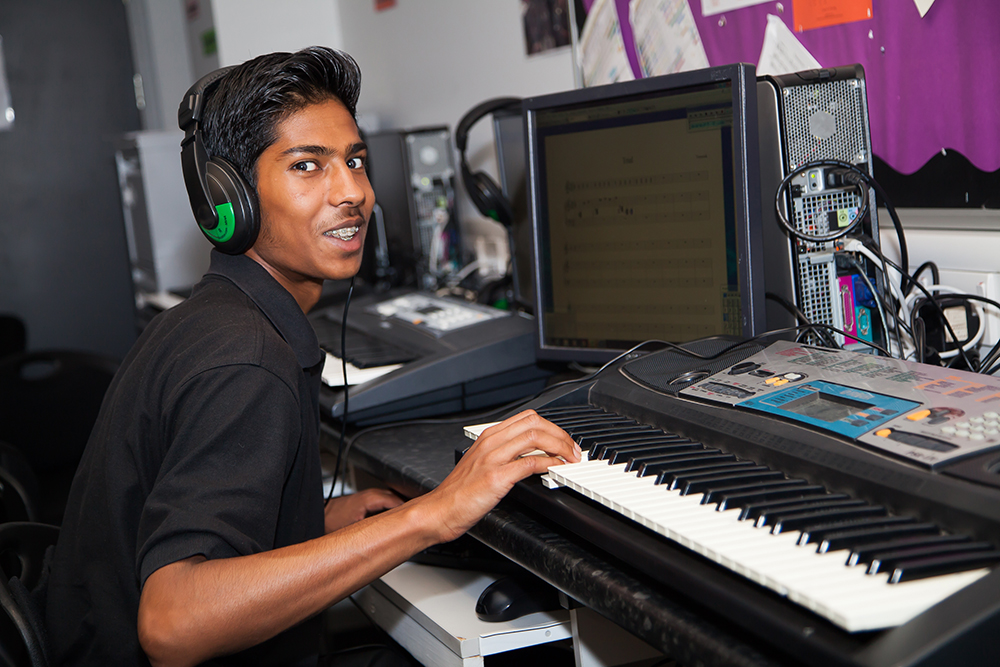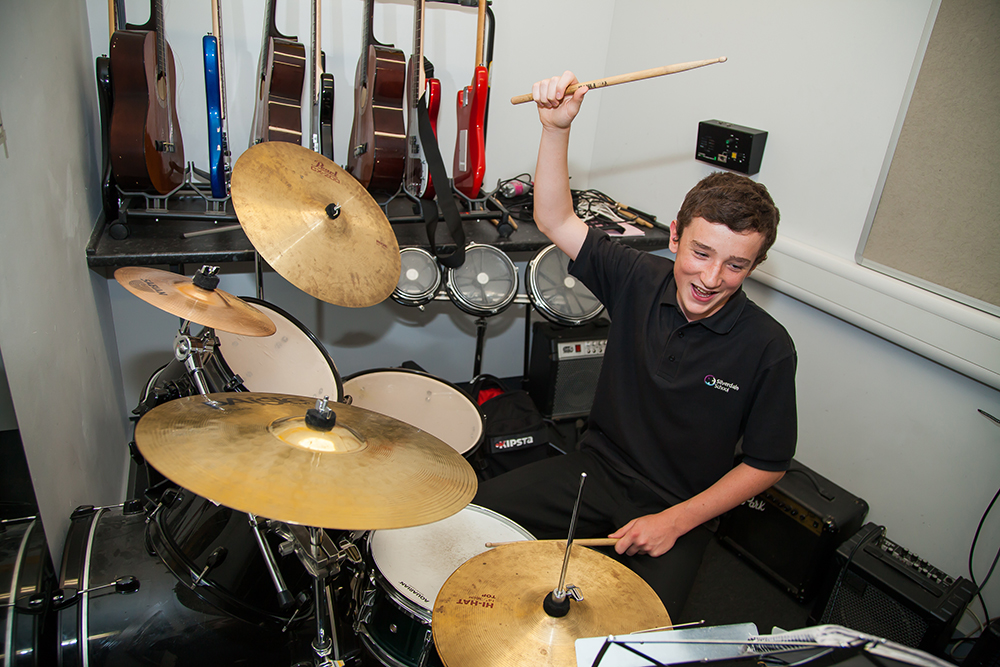Music
The Performing Arts Department aims to ignite a lifelong passion for the subject. We want students to be free to explore creatively above and beyond their expectations and challenge their own ideas with that of their peers. Our goal is to promote interest in the arts whilst developing lasting skills to carry them through into their chosen futures. The Performing Arts department offers a wide variety of extracurricular programmes that change throughout the year in order to engage students from all different cohorts. All pupils will be given every opportunity to develop their skills and talents via the curriculum and extracurricular courses.
Why choose to come to our school for this subject?
Music is a growing subject within the school and students respond well to the freedom, creativity and team-working skills developed throughout the various topics. The department offers an extensive list of extra-curriculum activities, such as a choir, orchestra, ukulele and guitar group, grade 5 theory group and opportunities to perform either on stage or in the band during whole-school productions. The department is equipped with lots of exciting instruments and music technology which students are encouraged to explore and experiment with.

KS3
At Key Stage 3, students will be given the opportunity to explore music of different genres and styles from a variety of cultures and periods of history. Music is taught in an active and hands-on approach and students are given the opportunity to explore sound through different instruments such as keyboards, ukuleles, guitars, voice, music technology and percussion. The curriculum is built around the musical foundations of performance, composition and listening analysis. Students are assessed twice a semester on their listening, performance and compositional skills. Students are encouraged to build their resilience, team working and confidence as well as their musicianship.
GCSE music
(EDUQAS EXAM BOARD)
The syllabus is as follows:
|
Component 1: Performing – Worth 30% of your GCSE (Marked by your teacher, moderated by Eduqas) |
|
You must perform at least 2 pieces: One piece must be an ensemble, the other(s) can be ensembles or solos. You can sing or play any instrument. You can have an accompanist or use a backing track, or perform unaccompanied. Backing tracks and accompaniments must not contain the part you are playing/singing. An ensemble in this course is described as a group of 2-8 live performers. You must not be performing the tune all the way through while the other performers accompany you. You must also be the only person performing your part. Each piece must be recorded in the same school year you take the exam, and your teacher must be present. Performing more difficult pieces – harder than Grade 3 standard – can boost your marks. You can perform easier pieces – below Grade 3 standard, but your marks will be scaled down a bit. Playing an easier piece well could result in a better mark than playing a harder piece badly! You will need to hand in a score or a lead sheet of each piece, so your teacher can assess how accurately you perform. You cannot hand in an audio/video guide track instead. If your performances last less than 4 minutes in total, you will lose marks. |
|
Component 2: Composing – Worth 30% of your GCSE (Marked by your teacher, moderated by Eduqas) |
|
You must compose two original pieces of music. Each is equally weighted. One is a free composition, which you can complete at any time in the course. The other must be written in response to a brief released by Eduqas on the 1st September in the same school year as you take the exam. They can both be in a similar style as long as the actual musical content is different. You will have to hand in an audio file of each piece – either a live recording (of you or someone else performing your piece) or an output from software. You will also need either a score or a lead sheet with a detailed description of each piece. You have to complete a composing log as well which is signed by you and your teacher to authenticate your work. This explains how you completed your work, if you used any ideas which were not your own (like drum loops) and if anyone else helped you. |
|
Component 3: Appraising – Worth 40% of your GCSE (A listening exam.) |
|
In your exam there will be 8 questions. Each will have an extract of music which is played out loud for you to answer the questions on what you hear. Question 1 and question 7 will always be on the set works. The questions will focus on three things: Elements of Music – melody, harmony, tonality, form and structure, dynamics, sonority, texture, tempo, rhythm, metre. The context – the time, place or purpose of the music Musical Language – the list of musical terms in Appendix C of the specification, notes in the treble and bass clef and any specific vocabulary which goes with the set works. |
Music is a popular and successful subject at GCSE, with results of 100% A* to A in 2016. Students will learn how to musically analyse pieces of different genres in a deep and succinct manner. They will develop their musicianship in performing and composing, using either music technology or traditional methods to create their own pieces. Like Key Stage 3, the subject is taught in an active style.
GCSE Music is a practical subject best suited for students who already play an instrument or those who have the passion and resilience to learn. The course is a mixture of musical analysis of music across an array of genres, performance as a soloist and within a group, and composition using music technology and other traditional methods. Lessons are really spent sat ‘behind a desk’, with students getting the freedom to explore and experiment in their own ways.

beyond the classroom
The department offers a wide range of extracurricular activities before school, at break, lunchtime and after school. All students are encouraged to get involved and enjoy the activities – whatever their level of ability is.
You can see the latest timetable for clubs and extracurricular activities here and at the bottom of this page.
The Music department puts on two concerts every year - The Winter Concert in December, and the Summer Festival in June. Tickets can be bought via our ticketsource shop here.
Where can I get instrumental lessons?
Students are offered instrumental lessons at Silverdale. We have 14 members of peripatetic (working across different places) instrumental staff. 5 of our teachers are from The Sheffield Music Hub along with 4 private teachers, and one teacher from Elegance Music School.
The school offers peripatetic lessons in piano, strings, woodwind, guitar, voice, drums, flute, brass and DJ lessons.
Demand for peripatetic lessons is high at Silverdale, and most instruments have a waiting list. To register your interest in instrumental lessons, please look at the Individual Music Lessons information at the bottom of the page.
Lessons are paid directly to peripatetic staff, not to Silverdale School. If your child has free school meals and is a GCSE student, please contact the music department as there are bursaries available.
All our fantastic teachers are either self-employed, work for Sheffield Music Hub or Elegance Music School so lesson prices vary dependent on instrument, and if your child requires an instrument on loan.
Singing lessons - Sally Doherty from Sheffield Music (link - Sally Doherty | Sheffield Music Hub)
Drum lessons - Liam Power from Sheffield Music Hub (link - Liam Power (Drums) | Sheffield Music Hub)
Flute lessons - Jill Vincent from Sheffield Music Hub (link - Jill Vincent | Sheffield Music Hub)
Saxophone/Clarinet lessons - Kim Storr from Sheffield Music hub - (link - Kim Storr | Sheffield Music Hub)
Cello lessons - Celia Hurwitz-Keefe from Sheffield Music Hub (link - Celia Hurwitz-Keefe (Strings) | Sheffield Music Hub)
Brass lessons - Matthew Knowles from Sheffield Music Hub (link - Mathew Knowles (Brass) | Sheffield Music Hub)
Guitar lessons - Ian Teacher from Sheffield Music Hub (link- Iain Teather (Guitar) | Sheffield Music Hub)
- Mark Finney
Violin Lessons - Roz Massey from Sheffield Music Hub (link - Roz Massey (Strings) | Sheffield Music Hub)
- Freya Roy from Elegance Music School
Piano lessons - Freya Roy from Elegance Music School (Beginner to Grade 5)
- Karin Finney (Grade 5 onwards)
DJ lessons - Ian Stanley from Creative DJ School
links
- Sheffield Music Hub
-
Eduqas GCSE Music - GCSE Music | Eduqas
Eduqas A Level Music - AS and A Level Music | Eduqas
Keep up to date with the Performing Arts department, share news and performances on Instagram
